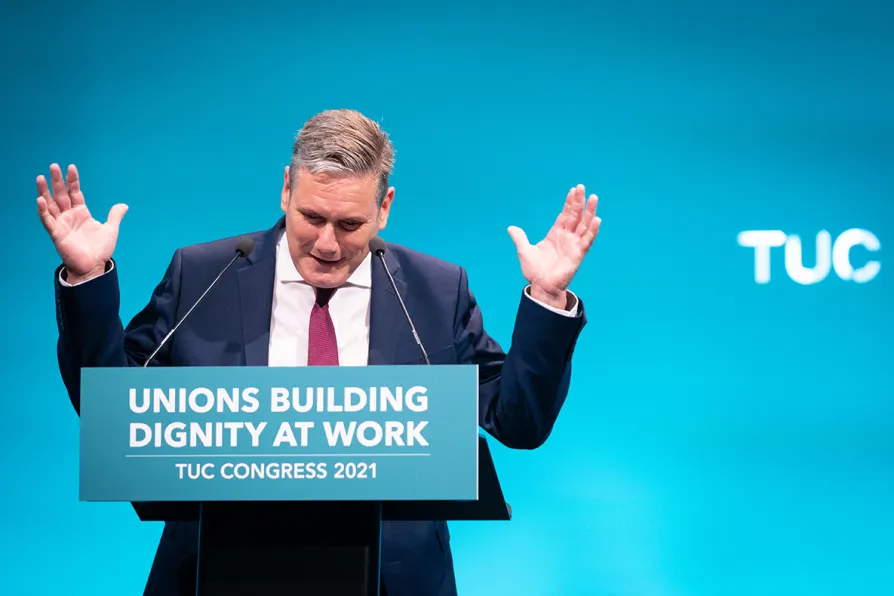
 Labour leader Sir Keir Starmer speaking at the TUC congress in London
Labour leader Sir Keir Starmer speaking at the TUC congress in London
IT IS in the run-up to Labour’s annual conference that the words of the great radical Scottish poet Robert Burns come to mind: “The best-laid schemes o’mice an’ men Gang aft agley.”
When, half a decade ago, Labour’s right wing came up with its cunning plan to minimise the risk that working-class pressure for radical policies — refracted through the affiliated trade unions — might begin to threaten the Westminster consensus, it enthusiastically embraced transatlantic-style primary politics on the US model.
The idea was that Labour folk — a loosely defined body of people, not necessarily party members, almost certainly not activists of any dangerous hue and, it was presumed, moderate types inclined to follow the middle way and defer to the greater wisdom and experience of their parliamentary representatives — should be “empowered” to elect the party leader.
None of the moderate middle-of-the-road candidates — barely distinguished from each other in politics or programme — excited the very large numbers of people who took up the invitation.
Instead these newly enfranchised recovered a sense that Labour could be the vehicle for radical change and elected, by a stonking majority, one of the key parliamentary figures who had stood for decades as a tribune of working-class politics, global peace, anti-imperialist solidarity and socialist values.
Such was the sense of shock felt by the parliamentary grandees, that they fell first into despair, then conspiracy and finally into serial sabotage.
Let us not tread again the wearisome road which saw Labour's leader and his principled defence of the referendum result subverted and the humiliating fall that this precipitated.
Instead, wonder at the enthusiasm with which Labour’s right wing, having turned the party’s participatory structures into a desert of democracy, now hopes to reimpose the constitutional model it today worried might devalue its grip on the machine and weaken the power of veto exercised by MPs.
Unite’s general secretary Sharon Graham was spot on in telling Labour MPs that the proposal to ditch the one member, one vote system introduced in 2014 will reduce the entire membership to one third of the vote, while inflating the vote of Labour MPs to one third.
This, she said, “is unfair, undemocratic and a backwards step for our party.”
Frontbencher Rachael Maskell made the principled point that as an MP she should have “no greater say” than other party members.
Trade unions have historically been extremely tolerant of the tendency of Labour MPs to disregard their views and those of the other component parts of the party.
This is perhaps the best opportunity in a long time for trade unionists to ensure that their union intervenes in this discussion and that delegates to next week’s conference defend the right of trade unionists to collectively exercise an influence commensurate with their numbers and importance in national politics and the affairs of the working class.
We can look back on decades of experience since the Tory government of Margaret Thatcher and John Major stripped trade unions and workers of a whole raft of employment rights and trade union freedoms.
Tony Blair and Gordon Brown, the two Labour leaders who could have delivered on the many promises Labour in opposition made to repeal the Tory anti-trade union laws, consistently failed to do so and Labour MPs, with notable exceptions, tolerated, and in some cases, exulted in this.
The best guarantee of the Labour Party becoming once again the trusted ally of the working people and forming a government of radical change lies in an alliance of Labour’s mass membership in active partnership with the trade unions.

‘People up and down the country are asking whose side is the Labour government on and coming up with the answer: not workers,’ Unite general secretary Sharon Graham says

From Gaza complicity to welfare cuts chaos, Starmer’s baggage accumulates, and voters will indeed find ‘somewhere else’ to go — to the Greens, nationalists, Lib Dems, Reform UK or a new, working-class left party, writes NICK WRIGHT












